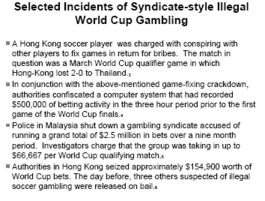The WAGER, Vol. 3(27) – All eyes on France: World Cup ‘98
Much like the Olympics, the World Cup championships unite the global community in an international fellowship of skill, agility, strength… and betting. With expanded television coverage and Internet attention, World Cup soccer has become more fan-accessible than ever before. But accompanying this information technology is a parallel development of the international sports gambling infrastructure.
Recent months have borne witness to a proliferation of gambling activity, legal and illegal, focusing on the World Cup championship and its preliminary matches. In addition to the usual office betting pools, soccer bettors can now place their wagers using an elaborate network of cyber-casinos and offshore Internet bookmakers. One such service is BETonline, hosted by the British Sporting Life website. The site, which is open to UK residents over the age of 18, allows netizens to place bets from approximately $5 to $825. Receiving about 500,000 hits each day, BETonline claims to be the third most popular sports web site in the world [1]. Also cashing in on soccer fever is the state-run English gambling firm, Tote, which launched a sizable advertising campaign last winter to promote its World Cup telephone betting service [2]. Yet not all soccer betting takes place under the auspices of government regulation and corporate-style bookmakers. A recent crackdown in Asia has revealed both the scope and nature of underworld gaming (see Figure below).

The issue of Internet gaming is hardly a new one in the gambling community. But the case of the World Cup offers pause to consider the topic from a different perspective. What are the inherent properties of soccer that predispose it to this kind of wagering? How does soccer differ from football, baseball, basketball and how do these differences reveal themselves in the gambling paradigms with which they are associated? For example, soccer is a low-scoring game which usually precludes the double-digit spreads to which Americans are accustomed. Do the international nature of the tournament and its associated production of nationalism affect betting habits? It is possible that soccer’s pre-existing culture of violence and lawlessness could provide a ripe atmosphere for illegal gambling. For Americans, who are accustomed to a few playoff games and a Super Bowl or World Series, the intense concentration of bracketed matches in a short period of time allows for a heightened pace and high number of possible outcomes when compared with baseball, football, and basketball. Just as the skills needed to score a goal differ from those needed to shoot a basket, so should we be cognizant of the inherent subtleties that suggest a more sensitive, multi-layered treatment of sports gambling.
Sources:
- (1998, June 8). Sport: Football Net betting kicks off. BBC Online Network. http://news.bbc.co.uk
- (1998, March 26). Tote to kick off World Cup ads. Marketing.
- (1998, June 13); Despatches Hong Kong footballer charged with match fixing. BBC Online Network. http://news.bbc.co.uk.
- ibid.
- (1997, Sept 11) Malaysian police cripple Internet soccer betting ring. AFP and Nando.net. http://wedge.nando.net.
- (1998, July 6) Police nab suspected bookmaker. Hong Kong Standard. www.hkstandard.com.
This public education project is funded, in part, by The Andrews Foundation and the National Center for Responsible Gaming.
This fax may be copied without permission. Please cite The WAGER as the source.
For more information contact the Massachusetts Council on Compulsive Gambling, 190 High Street, Suite 6, Boston, MA 02110, U.S.